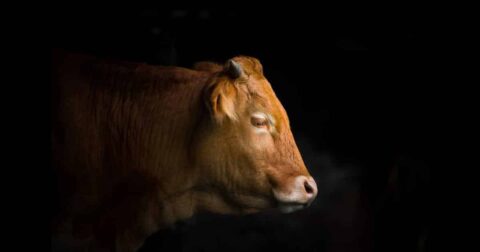News
Manure-to-Energy Digesters Were Sold as a Climate Fix. Now the USDA Is Hitting Pause.
Climate•9 min read
Reported
Animal agriculture is often left out of critical conversations about the climate crisis—including COP26. Plant-based food companies are calling for change.


Words by Jennifer Mishler
As world leaders convene in Glasgow for the United Nations Climate Conference (COP26), some of the largest plant-based food companies from around the globe released an open letter calling attention to the environmental harms of animal agriculture, often left out of climate change discussions—and most importantly—not addressed in climate policy or action.
The letter, alongside a petition with over 70,000 signatures, was presented at COP26 by Humane Society International, ProVeg International, and the Buddhist Tzu Chi Foundation. More than 16 companies including Beyond Investing, Eat Just, and Linda McCartney Foods signed on, asking leaders to address the impacts of animal agriculture in discussions at COP26.
Research shows that factory farming is accelerating the climate crisis. Despite only providing 18 percent of the world’s calories, the livestock industry uses 77 percent of the land used for agriculture—and contributes more than 16 percent of global greenhouse gas (GHG) emissions. One recent study found the animal agriculture industry’s impact to be much higher, at nearly 57 percent of food emissions.
“We simply cannot afford to ignore the cow in the room any longer—the science is clear that targets to reduce meat and dairy production and consumption are crucial if we are to meet internationally agreed-upon climate targets,” said Claire Bass, Executive Director of Humane Society International/UK.
Bass added that while consumers are showing a demand for a shift towards plant-based foods, world politicians “appear to be asleep at the wheel” when it comes to the need to “normalize” plant-based diets.
For nearly 30 years, the COP conference has brought together officials from around the world to respond to the accelerating climate crisis. This year’s conference began on October 31 and has led to some encouraging developments thus far, such as a pledge from the leaders of more than 100 countries to end deforestation by the year 2030.
It remains to be seen, though, whether governments will turn their discussions into meaningful action, or if agreements resulting from COP26 will be too little, too late. Organizations and environmentalists also criticized the conference for not serving a more sustainable menu consisting entirely of plant-based foods.
“The urgency of reducing our global intake of meat, fish, eggs, and dairy to tackle the climate crisis must be addressed, especially now that world leaders have reached an agreement during COP26 to tackle deforestation, and set a 30 percent methane reduction target,” said Jasmijn de Boo, Vice President of ProVeg International.
Methane is a potent GHG, one that has received considerably more discussion at COP26. According to Intergovernmental Panel on Climate Change (IPCC) reviewer Durwood Zaelke, “cutting methane is the biggest opportunity to slow warming between now and 2040.” There is simply no way to reduce methane emissions without radically overhauling the animal agriculture industry. Methane accounts for 44 percent of all livestock emissions, and the industry as a whole is responsible for nearly 32 percent of all methane emissions on the planet.
In October, Sophie Kevany reported for the Guardian, that large meat and dairy producers are adding to the climate crisis “by dragging their heels on methane,” as inaction from governments allows this to continue.
ProVeg estimates, citing various research, that by 2040, the consumption of meat must be reduced by 79 percent, dairy consumption by 74-83 percent, and egg and seafood consumption by 68 percent and 65 percent respectively if Europe is to meet its climate goals. Another new report takes the call to action a step further, suggesting that Ireland would need to cull more than 1 million cattle if it were to achieve its climate targets.
The United Nations (UN) has long been calling for a drastic change in the world’s consumption of meat, particularly in wealthy nations that are large contributors to the climate crisis. In 2010, a UN report urged a global shift towards plant-based eating, noting that a “substantial reduction” of climate impacts “would only be possible with a substantial worldwide diet change, away from animal products.” In 2013, the intergovernmental organization called for those in rich countries, particularly in the U.S. and Europe, to cut their meat consumption by half.
While meat and dairy producers have made commitments to reduce their own environmental footprint, they often fall short of these promises and fall back on greenwashing the industry. It is more and more clear that government action to force a reduction of animal agriculture’s impact is needed. Yet, a recent UN report, released just ahead of the UN Food Systems Summit, uncovered that the majority of farm subsidies are “harmful” to people and the planet, often incentivizing products with high GHG emissions and widening the gap between small farms and the industrial farms that increasingly dominate the agricultural industry.
As the world continues to grapple with the COVID-19 pandemic, attention is also being called to the ties between animal farming, the climate, and public health.
“There are clear connections between human health and planetary health. Zoonosis, vector-borne diseases, and certain non-communicable diseases such as diabetes and heart disease have inextricable links to our dietary habits,” said Dr. Ming-nan Lin of the Buddhist Tzu Chi Foundation and vice superintendent of Dalin Tzu Chi General Hospital.